Winter School 2024 Program Report
ウインタースクール・ベトナム2024が開催されました
The Faculty of Agriculture at Yamagata University (YU) in collaboration with the Faculty of Natural Resources and Environment at the Vietnam National University of Agriculture (VNUA) successfully conducted the "Sustainable Water Management and Food Security" Winter School. The one-week intensive program, held from February 26 to March 2, 2024, educated students pertinent issues concerning water supply and sanitation, agricultural water management, and food security. Fifteen students, comprised of nine from YU and six from VNUA, engaged in this immersive learning experience hosted at VNUA’s campus in Hanoi, Vietnam.山形大学(YU)農学部とベトナム国立農業大学(VNUA)自然資源環境学部は、共同し「持続可能な水管理と食料安全保障」をテーマとしたウインタースクールを実施しました。本学から9名、VNUAから6名の合計15名の学生が、ベトナム・ハノイのVNUAキャンパスを基点として2024年2月26日から3月2日まで開催された1週間の集中プログラムを通じ、水供給と衛生、農業用水管理、食糧安全保障に関する問題について学びました。
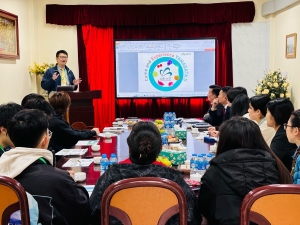
図1.歓迎の挨拶と山形大学農学部の紹介を行う渡部徹教授。
Participants enjoyed a rich blend of seminars and field experiences, focusing on the synergy between water infrastructure, agriculture, tourism, mining industry, aquaculture, and natural resource stewardship in various Vietnamese locales (Hanoi City, Bac Ninh, Ninh Binh, and Quang Ninh provinces).
参加者は、ベトナムの様々な地域(ハノイ市、バクニン省、ニンビン省、クアンニン省)における水インフラ、農業、観光、鉱業、水産養殖業、天然資源管理との相乗効果に焦点を当て、セミナーと現地体験を豊富に組み合わせたプログラムを享受しました。
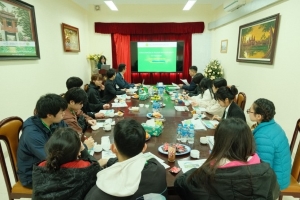
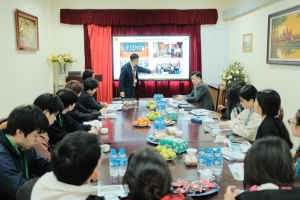
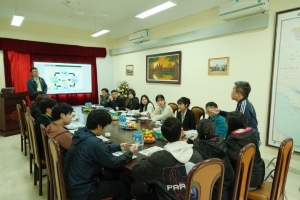
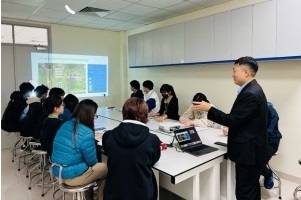
図2.ベトナムで新たに生じている水管理と食料安全保障に関する問題についての理解を深めるために、多くの講義やセミナーに参加しました
Interactive sessions with local stakeholders, including governmental authorities and cooperative representatives, enriched the students' understanding of the region's environmental challenges. These dialogues culminated in student-led initiatives aiming to innovate clean water supply and ensure food safety.
政府当局や協同組合の代表者を含む地元の関係者との対話型セッションにより、参加学生は地域の環境課題に対する理解を深めました。これらの対話は、清潔な水の供給と食の安全の確保を目指す、学生主導の新たな構想に結実しました。
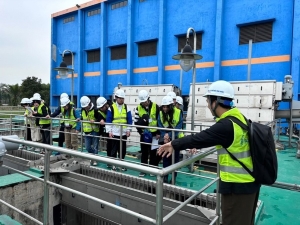
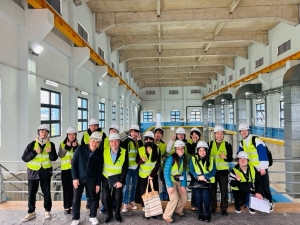
図3.テクニカルツアーに参加し、ハノイ郊外の水処理施設を訪問して水処理プロセスについて学び、ハノイの現在の水質と供給問題について理解を深めました。
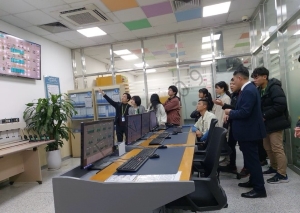
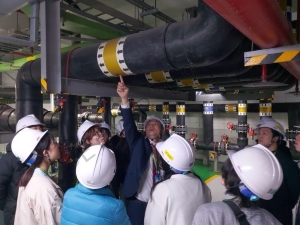
図4.バクニン省の廃水処理施設を訪れ、さまざまな種類の廃水源の処理プロセスを学び、現在の生活廃水の再利用と廃水の品質管理について理解を深めました
The program's practical aspect featured a joint research project between the two faculties on the reuse of treated municipal wastewater for rice cultivation at VNUA, offering the students hands-on experience in environmental surveying, sample collection, and laboratory water quality analysis.
このプログラムの実践的な取り組みとして、VNUAにおける稲作への都市廃水処理水の再利用に関する両学部の共同研究プロジェクトが行われ、参加学生は環境調査、サンプル採取、実験室での水質分析などの実習を体験しました。
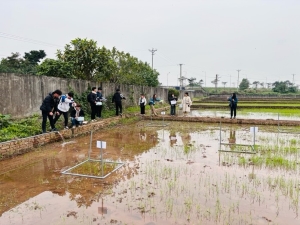
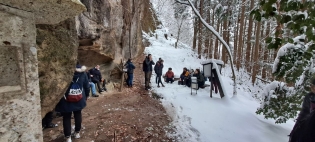
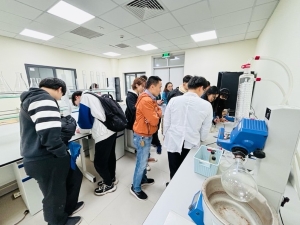
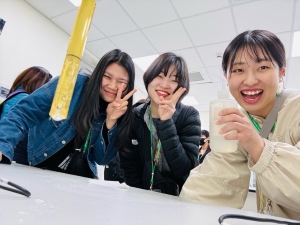
現地調査において灌漑用水を採取・分析し、VNUAの研究室でその水質を調査しました。
The program was further enriched by a number of fieldtrips to expose students with real-life examples and lessons, allowing them to deeply involved in and understand the circumstances from different perspectives, particularly through the direct communication with local communities, such as farmers and local tour guides.
たくさんのフィールドトリップにより、学生たちにとって実例や実体験に基づく豊かなプログラムが実現しました。農家や現地のツアーガイドなど現地のコミュニティと直接やり取りすることで、学生たちは様々な視点から状況に深く関わり、理解することができるようになりました。
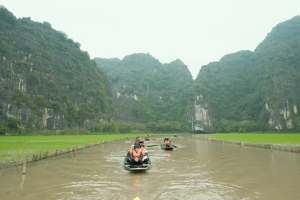
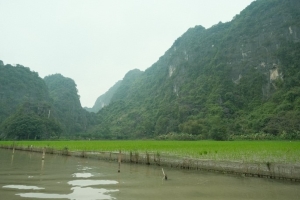
図6.テクニカルツアーに参加し、ニンビン省の稲作地域を訪れ、独特の水稲栽培方法について、またこのような農業と地域社会の生計が、観光強化と水質汚染に関連する新たな問題によってどのように脅かされているのかを学びました。
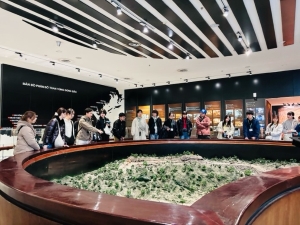
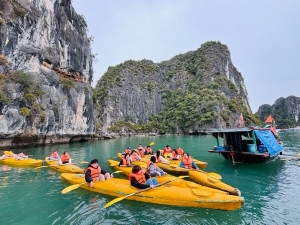
図7.ハロン湾を訪れ、鉱業や観光開発が水質、養殖、食の安全に及ぼす影響や、近隣の漁村の生計の変化について学びました
Cultural immersion in a number of heritage sites in each of locals visited complemented the academic schedule, fostering a deeper connection between participants and the local context.
各訪問地で多くの遺産を訪れ文化に対する造詣を深めることで、学術的な学びのほかに、参加者と現地の状況とのより深い結びつきが育ちました。
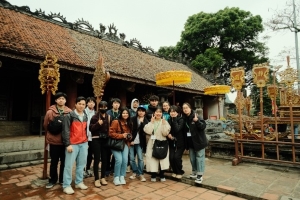
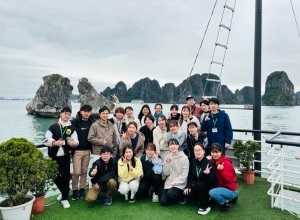
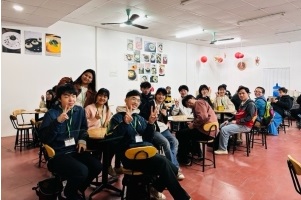
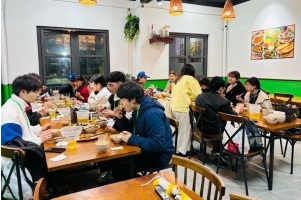
図8.ベトナムの文化、観光スポット、ベトナム料理を体験し堪能しました。
The Winter School facilitated a cross-cultural idea exchange, strengthening the skillsets of the participating students, which are anticipated to benefit their future career trajectories. このウインタースクールによって、異文化間のアイディア交換が促進されました。また、参加学生の知識や技能が強化され、学生の将来のキャリア形成により良い影響をもたらすことが期待できることでしょう。
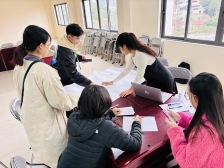
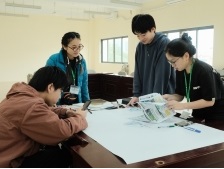
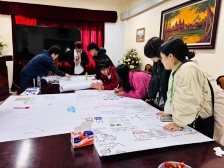
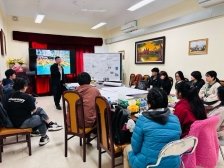
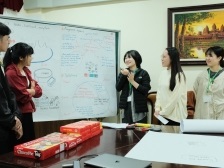
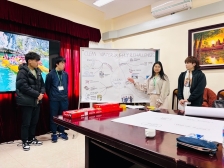
図9.プログラムを通しての学びや経験を討論し、報告する参加学生たち。
■掲載日:2024.04.08


